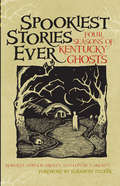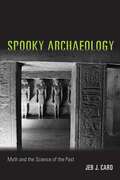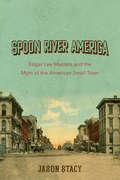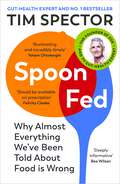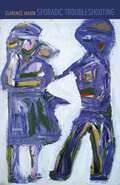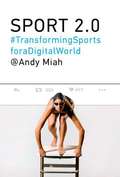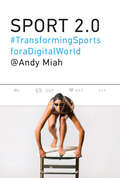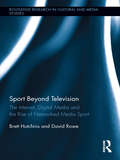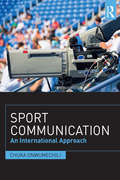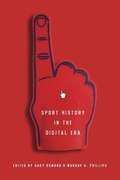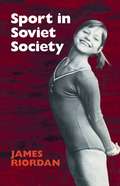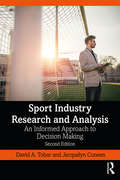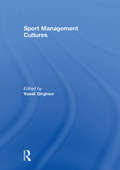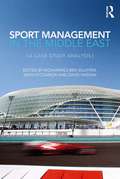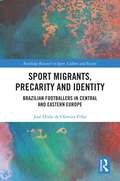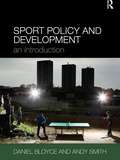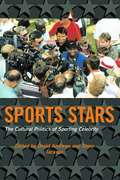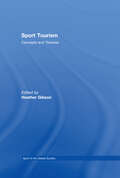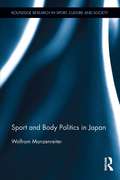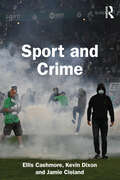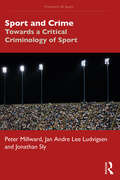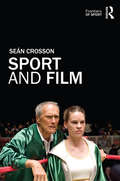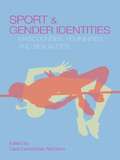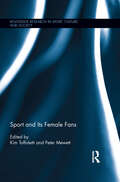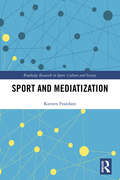- Table View
- List View
Spookiest Stories Ever: Four Seasons of Kentucky Ghosts
by Roberta Simpson Brown Lonnie E. BrownA collection of haunting tales set among the landscapes and landmarks of the Bluegrass State.Tree branches scratching at your window on a stormy April night . . . The hot, sticky oppression of a stifling summer&’s day . . . November leaves rustling as a chill sneaks into your bones . . . The darkened days of winter . . . No matter what the season, it&’s always a good time for a ghost story.From masterful storytelling duo Roberta and Lonnie Brown comes Spookiest Stories Ever: Four Seasons of Kentucky Ghosts, a creepy collection of tales from their home state. Featuring familiar Kentucky landmarks such as the Palace Theater and the Waverly Hills Sanatorium in Louisville and Shaker Village of Pleasant Hill, these accounts from across the commonwealth are sure to put a tingle in the reader&’s spine.These notable stories, including tales of the &“chime child&” who can see and talk to ghosts, graveside appearances, and the Spurlington Witch of Taylor County, occur in all four seasons and come from every corner of Kentucky. An essential part of the American storytelling tradition, these ghost stories will delight those who love getting goose bumps all year long.
Spooky Archaeology: Myth and the Science of the Past
by Jeb J. CardOutside of scientific journals, archaeologists are depicted as searching for lost cities and mystical artifacts in news reports, television, video games, and movies like Indiana Jones or The Mummy. This fantastical image has little to do with day-to-day science, yet it is deeply connected to why people are fascinated by the ancient past. By exploring the development of archaeology, this book helps us understand what archaeology is and why it matters.In Spooky Archaeology author Jeb J. Card follows a trail of clues left by adventurers and professional archaeologists that guides the reader through haunted museums, mysterious hieroglyphic inscriptions, fragments of a lost continent that never existed, and deep into an investigation of magic and murder. Card unveils how and why archaeology continues to mystify and why there is an ongoing fascination with exotic artifacts and eerie practices.
Spoon River America: Edgar Lee Masters and the Myth of the American Small Town
by Jason StacyFrom Main Street to Stranger Things, how poetry changed our idea of small town life A literary and cultural milestone, Spoon River Anthology captured an idea of the rural Midwest that became a bedrock myth of life in small-town America. Jason Stacy places the book within the atmosphere of its time and follows its progress as the poetry took root and thrived. Published by Edgar Lee Masters in 1915, Spoon River Anthology won praise from modernists while becoming an ongoing touchstone for American popular culture. Stacy charts the ways readers embraced, debated, and reshaped Masters's work in literary controversies and culture war skirmishes; in films and other media that over time saw the small town as idyllic then conflicted then surreal; and as the source of three archetypes—populist, elite, and exile—that endure across the landscape of American culture in the twenty-first century. A wide-ranging reconsideration of a literary landmark, Spoon River America tells the story of how a Midwesterner's poetry helped change a nation's conception of itself.
Spoon-Fed: Why almost everything we’ve been told about food is wrong, by the #1 bestselling author of Food for Life
by Tim SpectorTHE #1 SUNDAY TIMES BESTSELLER FROM THE LEADING GUT-HEALTH EXPERT, FOUNDER OF ZOE AND AUTHOR OF FOOD FOR LIFE* As seen on ITV's LORRAINE and heard on THE DIARY OF A CEO *This ground-breaking exploration debunks food myths, from what we should be eating for breakfast to whether we should really avoid ultra-processed foods.Is breakfast really the most important meal of the day?Is there any point in counting calories?Is there any evidence that coffee is bad for us?Through his pioneering research, Professor Tim Spector busts these and many other myths about food.Spoon-Fed explores the scandalous lack of good science behind many diet plans, official recommendations, miracle cures and ultra-processed foods, and encourages us to rethink our whole relationship with food - not just for our health as individuals, but for the future of the planet.'Hugely enjoyable' Michael Mosley'Illuminating and so incredibly timely' Yotam Ottolenghi'This book should be available on prescription' Felicity Cloake'Will actually help you decide what to add to your next grocery shop' Bee Wilson, GuardianGo with your gut. Join the food revolution.**Tim Spector's number 1 bestselling Food for Life: Your Guide to the New Science of Eating Well is now available in paperback****PRE-ORDER THE FOOD FOR LIFE COOKBOOK, COMING OCTOBER 2024, NOW**
Sporadic Troubleshooting: Poems
by Clarence MajorDeeply felt and brimming with humor and philosophical inquiry, Sporadic Troubleshooting, the latest volume from Clarence Major, both acknowledges poetic literary tradition and explores exciting new territories in language. Throughout, Major uses an improvisational technique, applying it to well-known mythological stories to enhance narrative and lyrical intensity. Breathtakingly vivid, these poems are testaments to universal subjects such as love, charity, nature, fear, survival, loyalty, justice, and beauty. Major’s poems offer vigorous inquiries into life and art with a view toward renewal and transformation.
Sport 2.0: Transforming Sports for a Digital World
by Andy MiahDigital technology is changing everything about modern sports. Athletes and coaches rely on digital data to monitor and enhance performance. Officials use tracking systems to augment their judgment in what is an increasingly superhuman field of play. Spectators tune in to live sports through social media, or even through virtual reality. Audiences now act as citizen journalists whose collective shared data expands the places in which we consume sports news. In Sport 2.0, Andy Miah examines the convergence of sports and digital cultures, examining not only how it affects our participation in sport but also how it changes our experience of life online. This convegence redefines how we think of about our bodies, the social function of sports, and the kinds of people who are playing. Miah describes a world in which the rise of competitive computer game playing -- e-sports -- challenges and invigorates the social mandate. Miah also looks at the Olympic Games as an exemplar of digital innovation in sports, and offers a detailed look at the social media footprint of the 2012 London Games, discussing how organizers, sponsors, media, and activists responded to the world's largest media event. In the end, Miah does not argue that physical activity will cease to be central to sports, or that digital corporeality will replace the nondigital version. Rather, he provides a road map for how sports will become mixed-reality experiences and abandon the duality of physical and digital.
Sport 2.0: Transforming Sports for a Digital World (The\mit Press Ser.)
by Andy MiahRamifications of the convergence of sports and digital technology, from athlete and spectator experience to the role of media innovation at the Olympics.Digital technology is changing everything about modern sports. Athletes and coaches rely on digital data to monitor and enhance performance. Officials use tracking systems to augment their judgment in what is an increasingly superhuman field of play. Spectators tune in to live sports through social media, or even through virtual reality. Audiences now act as citizen journalists whose collective shared data expands the places in which we consume sports news. In Sport 2.0, Andy Miah examines the convergence of sports and digital cultures, examining not only how it affects our participation in sport but also how it changes our experience of life online. This convergence redefines how we think of about our bodies, the social function of sports, and the kinds of people who are playing. Miah describes a world in which the rise of competitive computer game playing—e-sports—challenges and invigorates the social mandate. Miah also looks at the Olympic Games as an exemplar of digital innovation in sports, and offers a detailed look at the social media footprint of the 2012 London Games, discussing how organizers, sponsors, media, and activists responded to the world's largest media event.In the end, Miah does not argue that physical activity will cease to be central to sports, or that digital corporeality will replace the nondigital version. Rather, he provides a road map for how sports will become mixed-reality experiences and abandon the duality of physical and digital.
Sport Beyond Television: The Internet, Digital Media and the Rise of Networked Media Sport (Routledge Research in Cultural and Media Studies)
by David Rowe Brett HutchinsTelevision is no longer the only screen delivering footage and news to people about sport. Computers, the Internet, Web, mobile and other digital media are increasingly important technologies in the production and consumption of sports media. Sport Beyond Television analyzes the changes that have given rise to this situation, combining theoretical insights with original evidence collected through extensive research and interviews with people working in the media and sport industries. It locates sports media as a pivotal component in online content economies and cultures, and counteracts the scant scholarly attention to sports media when compared to music, film and publishing in convergent media cultures. An expanding array of popular sports media – industry, user, club, athlete and fan produced – is now available and accessible in networked digital communications environments. This change is confounding the thinking of major sports organizations that have lived off the generous revenue flowing from exclusive broadcast contracts with free-to-air and subscription television networks for the last five decades. These developments are creating commercial and policy confusion, particularly as sports audiences and the advertising market fragment in line with the proliferation of niche channels and sources of digital sports media. Chapters in this title examine the shift from broadcast to online sports media markets, the impact of social networking platforms like Twitter and Facebook, evolving user and fan practices, the changing character of sports journalism, and the rise of sports computer gaming. Each chapter traces the socio-cultural implications of trends and trajectories in media sport.
Sport Communication: An International Approach
by Chuka OnwumechiliSport is a global business. Now more than ever, sport communication professionals need to understand sport’s global reach in order to develop their full potential. This is the first textbook to introduce the fundamental principles and practice of sport communication from an international perspective. Combining business strategies with insights into social issues such as gender, disability and national identity, this is an accessible, practical and engaging guide to the essentials of sport communication. Aimed to enhance learning at both undergraduate and postgraduate levels, each chapter contains special features tailored to meet the needs of students and instructors. These include learning objectives, chapter summaries, activities, reflections, discussion questions, recommended resource lists and original cross-cultural case studies that demonstrate sport communication theories put into practice. Its twenty chapters explore communication in sport across all levels, from interpersonal communication and team building to strategic communications, and in all forms of media, from print and broadcast to social media. Sport Communication: An International Approach is an essential text for any course on sport communication, sport business or sport management.
Sport History in the Digital Era
by Murray G Phillips Gary OsmondFrom statistical databases to story archives, from fan sites to the real-time reactions of Twitter-empowered athletes, the digital communication revolution has changed the way fans relate to LeBron's latest triple double or Tom Brady's last second touchdown pass. In this volume, contributors from Australia, Ireland, New Zealand, the United Kingdom, and the United States analyze the parallel transformation in the field of sport history, showing the ways powerful digital tools raise vital philosophical, epistemological, ontological, methodological, and ethical questions for scholars and students alike. Chapters consider how philosophical and theoretical understandings of the meaning of history influence engagement with digital history, and conceptualize the relationship between history making and the digital era. As the writers show, digital media's mostly untapped potential for studying the recent past via media like blogs, chat rooms, and gambling sites forge a symbiosis between sports and the internet while offering historians new vistas to explore and utilize. In this new era, digital history becomes a dynamic site of enquiry and discussion where scholars enter into a give-and-take with individuals and invite their audience to grapple with, rather than passively absorb, evidence. Timely and provocative, Sport History in the Digital Era affirms how the information revolution has transformed sport and sport history--and shows the road ahead. Contributors include Douglas Booth, Mike Cronin, Martin Johnes, Matthew Klugman, Geoffery Z. Kohe, Tara Magdalinski, Fiona McLachlan, Bob Nicholson, Rebecca Olive, Gary Osmond, Murray G. Phillips, Stephen Robertson, Synthia Sydnor, Holly Thorpe, and Wayne Wilson.
Sport In Soviet Society: Development of Sport and Physical Education in Russia and the Ussr (Soviet and East European Studies #22)
by James RiordanThe basic material for this book was gathered in different parts of the Soviet Union from i960 to 1975, eventually materialising as a PhD thesis for the University of Birmingham. My thanks are due particularly to my former colleagues and team mates at Progress Publishers, Moscow, Yuri Sdobnikov and Len Stoklitsky, for firing my enthusiasm yet harnessing my energy; they are, of course, not a whit responsible for any of the views I express.
Sport Industry Research and Analysis: An Informed Approach to Decision Making
by Jacquelyn Cuneen David A. TobarSport Industry Research and Analysis offers a straightforward, no nonsense approach to research design and statistical analyses in sport organizations. This fully revised and updated new edition describes the research process, from identifying a research question to analyzing data, and uses real world scenarios to help students and industry professionals understand how to conduct research and apply the results in their wider work. The book includes clear, step-by-step instructions for the analysis and interpretation of data. It explains how to use Excel and SPSS for every key statistic and statistical technique, with screenshots illustrating every step and additional scenarios providing further context. "In Practice" contributions from sport industry professionals demonstrate how these practitioners use statistical analyses in their everyday tasks, and this new edition includes expanded sections on conducting a literature review and research ethics, as well as ancillary materials for instructors including slides, test questions, data files, answer sheets, and videos. This is the clearest and most easy-to-use guide to research and analysis techniques in sport, helping the reader to build essential skills and confidence in using statistics, vital to support decision-making in any sport enterprise. It is an essential text for any sport business research methods course, and an invaluable reference for all sport industry professionals.
Sport Management Cultures
by Vassil GirginovThis is the first book to address the link between culture and sport management. The aim is to demonstrate that culture profoundly affects how we research, teach and practice sport management. The book engages with the concept of culture both as an abstract analytical category and specific beliefs and practices. It recognizes that a single best way of managing does not exist; that the applicability of management theories may stop at national boundaries; and that fundamental cultural values act as a strong determinant to managerial ideology and practice. Culture makes the study of sport management interesting because it challenges many taken-for-granted assumptions about management, yet it reinforces our belief in the existence of common management problems. The book offers a comprehensive review of the conceptualisations of culture and its relation with sport management by examining a range of issues: the emergence of multiculturalism as a policy issue; the impact of commonly shared cultural values within the fitness industry on managers and organisations behaviour; building cultural bridges in community sport organisations; cultural meanings attached to the consumption of Olympic merchandise, and culturally-informed interpretation through a reflective analysis of sport management texts. This book was published as a special issue of European Sport Management Quarterly.
Sport Management in the Middle East: A Case Study Analysis
by Sean O'Connor David Hassan Mohammed Ben SulayemThe Middle East is one of the fastest growing and significant markets in world sport, as well as a powerful source of investment in sport. Bids for the Olympics in 2020 and the soccer World Cup in 2022, as well as remarkable investments in Formula One motor racing, horse racing and English Premier League soccer clubs, demonstrate the strength of interest, the depth of resource and the technical expertise maintained by sport business interests in the region. Sport Management in the Middle East is the first book to offer a serious and in-depth analysis of the business and management of sport in the region. Written by a team of world leading researchers in Middle Eastern sport, and illustrated in full colour throughout, the book examines the importance of sport in the Middle East and introduces its particular management processes, structures and cultures. As well as providing an overview of the region’s sporting strategy and key stakeholders, the book also offers a number of detailed case-studies of sport in individual Middle Eastern countries. A unique guide to sport management in a region of fundamental importance in world sport, this book is essential reading for any serious student or scholar of sport management, sport business, Middle East studies, or sport and society.
Sport Migrants, Precarity and Identity: Brazilian Footballers in Central and Eastern Europe (Routledge Research in Sport, Culture and Society)
by José Hildo de Oliveira FilhoThis book takes a close look at the experiences of migrant athletes, their precarious careers, and at what this can tell us about wider themes of globalisation, identity, race, gender, and the body.Based on in-depth ethnographic research on male Brazilian footballers and futsal players working in Central and Eastern Europe, this book helps to fill gaps in previous research on sports migration and global sports labor markets. This book uses life-history interviews to reveal how race, gender, and class are articulated in the everyday experiences of migrant athletes; how they express their religious affiliations; and how they navigate the relationships with injuries and pain that are characteristic of precarious athletic careers. This book considers the transnational networks that are essential in sustaining international athletic labor flows and the role that borders and emotions play in the lives of sports migrants and also the agency that migrant athletes can have in issues such as player development and retention.Presenting a more nuanced, ground-level perspective on sports migration and the sociological dialogue between identity, culture, and the body, this book is fascinating reading for anybody with an interest in the socio-cultural study of sport, migration, globalization, or global inequalities.
Sport Policy and Development: An Introduction
by Andy Smith Daniel BloyceWho makes sport policy and why do we need it? What is the purpose of sport development programmes? Sport Policy and Development answers these questions and more by closely examining the complex relationships between modern sport, sport policy and development and other aspects of the wider society. These important issues are explored via detailed case studies of key aspects of sport policy and sport development activity, including: school sport and physical education social inclusion health elite sport sporting mega-events. Each case study demonstrates the ways in which the sport policy and development fields have changed, and are continually changing in response to the increasing political, social and cultural significance of sport. The book helps the reader to understand the complexities of the sport policy-making process, the increasing intervention of government in the sport policy and development fields, and how the short-term, ever-changing and frequently contradictory political priorities of government come to impact on the practice of sport policy and development. Accessible and engaging, this textbook is an invaluable introduction to sport policy and sport development for students, practitioners and policy-makers alike.
Sport Stars: The Cultural Politics of Sporting Celebrity
by David L. Andrews Steven J. JacksonIn a culture obsessed with celebrity, sportmen and women are some of the highest profile figures. We are fascinated by sport stars' lifestyles, love lives, and earning power. Sport Stars investigates the nature of contemporary sporting celebrity, examining stars' often turbulent relationships with the media, and with the sporting establishment.Through a series of case studies of sporting stars, including Diego Maradona, Michael Jordan, Venus Williams and David Beckham, contributors examine the cultural, political, economic and technological forces which combine to produce sporting celebrity, and consider the ways in which these most public of individuals inform and influence private experience.
Sport Tourism (Sport in the Global Society)
by Heather GibsonThe study of sport tourism is on the cusp of moving from a descriptive phase of research into an analytical phase. Consequently, many academics and graduate students are searching for theories upon which to ground their work. This book draws upon theories and concepts from sociology and anthropology (the socio-cultural perspective), sport and tourism studies, and business studies. One of the dangers of a new area of study is that the body of knowledge is built on a range of seemingly unrelated studies. By grounding work in a theoretical perspective, future work can be linked to, and contribute to building a cohesive understanding of various aspects of sport tourism. This book is an edited collection written by some of the top scholars working in a particular domain throughout the world, providing a compendium of theories and concepts that can be used to frame research on various aspects of sport tourism.This volume was previously published as a special issue of the journal Sport in Society.
Sport and Body Politics in Japan (Routledge Research in Sport, Culture and Society #26)
by Wolfram ManzenreiterThere is more to Japanese sport than sumo, karate and baseball. This study of social sport in Japan pursues a comprehensive approach towards sport as a distinctive cultural sphere at the intersection of body culture, political economy, and cultural globalization. Bridging the gap between Bourdieu and Foucault, it explains the significance of the body as a field of action and a topic of discourse in molding subject and society in modern Japan. More specifically, it provides answers to questions such as how and to what purposes are politics of the body articulated in Japan, particularly in the realm of sport? What is the agenda of state actors that develop politics aiming at the body, and to what degree are political and societal objectives impacted by commercial and non-political actors? How are political decisions on the allocation of resources made, and what are their consequences for sporting opportunities and practices of the body in general? Without neglecting the significance of sport spectatorship, this study takes a particular angle by looking at sport as a field of practice, pain and pleasure.
Sport and Crime
by Ellis Cashmore Kevin Dixon Jamie ClelandThis comprehensive review of the relationship between sport and crime explains how the experience of sport can lead to behaviour that’s harmful to others and is sometimes self-destructive. It challenges the conventional idea of sport as wholesome and beneficial, arguing that sport is often a trigger for crime, in both history and contemporary life.The book explores how murder, violence, bribery, sexual assault, matchfixing, corporate corruption, crowd disorder, hate crimes, drug offences, alcohol-induced transgressions and cyber-crimes are often caused or accelerated by sport, and it speculates on sports-related crimes of the future. The book’s narrative is driven by hundreds of case studies, and each chapter has summary points. There are also eight descriptive timelines that enable the reader to see at a glance how sport has, over the decades and centuries, been a catalyst for crime.This is an essential text for any course on sport and crime and invaluable reading for anybody with an interest in the sociology of sport, sport history, sports law, sport management, sport development, criminology or cultural studies. Anyone seriously interested in the study of sport will be gripped.
Sport and Crime: Towards a Critical Criminology of Sport (Frontiers of Sport)
by Peter Millward Jan Andre Ludvigsen Jonathan SlyThis is the first book to explore fully the connections between sport studies and criminology, opening up critical new frontiers in the study of sport and crime. Rooted firmly in established critical criminological traditions, the book also employs insights from emerging theoretical frameworks such as cultural criminology, governmentality theory and critical security studies to make better sense of a range of transnational and contemporary cases, events and trends that reveal, in different ways, the crimes and harms that are present in sport. Empirically grounded, including case studies of the 2022 World Cup in Qatar and the Tokyo 2020 Olympic Games, it explores emerging themes in contemporary sport, including but not limited to corruption, doping, youth crime, terrorism, violence and transgression, and human rights abuses. Sport and Crime consciously pushes the boundaries of what might be considered the critical criminology of sport. This is an essential text for any course on sport and crime, and invaluable reading for any student or researcher with an interest in the sociology of sport, sport development, sport policy, the politics of sport, critical criminology, or socio-legal studies.
Sport and Film (Frontiers of Sport)
by Seán CrossonThe sports film has become one of commercial cinema's most recognizable genres. From classic boxing films such as Raging Bull (1980) to soccer-themed box-office successes like Bend it Like Beckham (2002), the sports film stands at the interface of two of our most important cultural forms. This book examines the social, historical and ideological significance of representations of sport in film internationally, an essential guide for all students and enthusiasts of sport, film, media and culture. Sport and Film traces the history of the sports film, from the beginnings of cinema in the 1890s, its consolidation as a distinct fiction genre in the mid 1920s in Hollywood films such as Harold Lloyd’s The Freshman (1925), to its contemporary manifestation in Oscar-winning films such as Million Dollar Baby (2004) and The Fighter (2010). Drawing on an extensive range of films as source material, the book explores key issues in the study of sport, film and wider society, including race, social class, gender and the legacy of 9/11. It also offers an invaluable guide to 'reading' a film, to help students fully engage with their source material. Comprehensive, authoritative and accessible, this book is an important addition to the literature in both film and media studies, sport studies and cultural studies more generally.
Sport and Gender Identities: Masculinities, Femininities and Sexualities
by Cara Carmichael AitchisonThis important new book brings together gender studies and sexuality studies to provide original and critical insights into processes of identity formation in a wide range of sport-related contexts. The authors draw on contemporary debates concerning gender and identity from a range of disciplines including sociology, social and cultural geography, media studies and management studies, to address key issues in masculinity, femininity and sexuality: Part 1: Representing masculinities in sport analyses media representations of men’s sports, exploring the variety and complexity of concepts of masculinity. Part 2: Transgressing femininities in sport makes use of case studies to examine the experiences of women in male-dominated sporting arenas. Part 3: Performing sexualities in sport analyses the role of queer theory in sport studies, explores experiences of and responses to homophobia in sport, and examines the significance of the Gay Games. This book will be of particular interest to students and academics working in sport studies, leisure studies, gender studies, queer and sexuality studies, social and cultural geography, and sociology.
Sport and Its Female Fans (Routledge Research in Sport, Culture and Society #17)
by Kim Toffoletti Peter MewettWhy do women follow sports? How do they participate from the sidelines and what is the significance of this contribution? What can female fandom tell us about gender relations in sport? This book explores these and related questions by bringing together the varied strands of research being conducted internationally across the social sciences and humanities on this emerging and topical field. While sports spectatorship is a popular and well-respected site of analysis, no book-length, scholarly contribution documents women’s experiences of sports fandom. For this reason, there is an obvious need for a book that offers researchers, students and non-professional readers an authoritative introduction to women’s modes of sport support. Sport and Its Female Fans will be a landmark contribution in the field of sport research and in studies of sports fandom, making an original contribution to the growing, yet under-researched, area of female sports spectators.
Sport and Mediatization (Routledge Research in Sport, Culture and Society)
by Kirsten FrandsenContemporary society is highly media-saturated, and no sector more so than sport. Drawing on case studies from the Tour de France to fitness apps, this book introduces the concept of ‘mediatization’ and examines how media - historically and currently – are significant drivers for social and cultural change in sport. Utilizing different analytical approaches, case studies illustrate how so-called legacy media have historically been involved in the establishment of the institution of sport and have persistently been heavily involved in structural changes in the same domain. However, digital media currently add significantly to the development of a more complex picture of globalized interdependencies and still growing media presence in all aspects of the everyday lives of both sporting organizations, athletes and audiences/fans. The book seeks to eschew media centrism, acknowledging that changes are not only ’driven’ by media but also related to other macro-social forces of change, such as globalization, commercialization, and individualization. Offering a new analytical framework, Sport and Mediatization enables students and scholars in the transdisciplinary field of media and sports studies to analyze and understand the influence of media in a much more complex environment.
